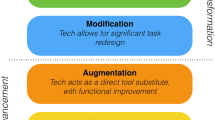Abstract
This article concerns the relationship between classroom assessments that are aligned with “competencies-based” teaching in Teacher Education programs on the one hand, and on the other hand, the challenge of offering authentic “philosophy of education,” “education theory,” or “education foundations” courses for student–teachers who are enrolled in a professional degree and on the way towards certification. Briefly, administrative and accreditation concerns with developing and demonstrating core “competencies” when teaching is considered strictly as a “profession” do not align with more ancient understandings of teaching as a “way of life”—especially when that life is led in some relation to philosophy, or “the pursuit of wisdom.” This article examines the disjunction between these two conceptualizations of teaching; it encourages readers to think about how this disjunction problematizes their pedagogy as “philosophers of education.”


Similar content being viewed by others
References
Aquinas, S. T. (1966). Summa Theologica. (J. Aumann, Trans.). London: Blackfriars. Aquinas, (2a2ae.179–182).
Aristotle. (2001). The basic works. In R. McKeon (Ed.), New York: Modern Library.
Bailey, R. (Ed.). (2010). The Philosophy of Education: An Introduction. Continuum.
Baughman, J. A., Brumm, T. J., & Mickelson, S. K. (2012). Student professional development: Competency-based learning and assessment. Journal of Technology Studies, 38(2), 115–127.
Burgoyne, J. G. (1993). The competence movement: Issues, stakeholders and prospects. Personnel Review, 22(6), 6–13.
Drisko, J. W. (2014). Competencies and their assessment. Journal of Social Work Education, 50, 414–426.
Gardner, S. K. (2009). Student development theory: A primer. ASHE Higher Education Report, 34(6), 15–28.
Government of Alberta. (1997). Teaching Quality Standard Applicable to the Provision of Basic Education in Alberta. Ministerial Order #016/97.
Government of Alberta. (2016). Department of Education Draft Teaching Quality Standard. Teaching and Leadership Excellence: Alberta Education.
Government of Alberta. (2018). Teaching Quality Standard. Alberta Education. Retrieved from, https://education.alberta.ca/media/3739620/standardsdoc-tqs-_fa-web-2018-01-17.pdf
Gregory, K., Cameron, C., & Davies, A. (2000). Self-assessment and goal-setting. Courtenay: Building Connections Publishing.
Hadot, P. (1995). Philosophy as a way of life. (Arnold I. Davidson Trans.). (Ed.). Michael Chase. Oxford: Blackwell Publishing.
Hadot, P. (2002). What is ancient philosophy? (M. Chase Trans.). London: Harvard University Press.
Hoffmann, T. (1999). The meanings of competency. Journal of European Industrial Training, 23(6), 275–285.
Jones, E. A., & Voorhees, R. A. (2002). Defining and assessing learning: Exploring competency-based initiatives. Report of the National Postsecondary Education Cooperative Working Group on Competency-Based Initiatives in Postsecondary Education. Retrieved from http://nces.ed.gov/pubs2002/2002159.pdf
Kingsley, P. (1995). Ancient philosophy, mystery, and magic: Empedocles and pythagorean tradition. Oxford: Clarendon Press.
Kingsley, P. (1999). In the dark places of wisdom. Point Reyes: The Golden Sufi Centre.
Kingsley, P. (2003). Reality. Point Reyes: The Golden Sufi Centre.
Meyer, H.-D. (2017). The limits of measurement: Misplaced precision, phronesis, and other Aristotelian cautions for the makers of PISA, APPR, etc. Comparative Education, 53(1), 17–34. https://doi.org/10.1080/03050068.2017.1254981.
Meyer, H.-D., & Benavot, A. (2013). PISA, power, and policy: The emergence of global educational governance. Providence: Symposium Books.
Newmann, F. M., Marks, H. M., & Gamoran, A. (1996). Authentic pedagogy and student performance. American Journal of Education, 104(4), 280–312.
Noddings, N. (2012). Philosophy of Education. New York: Westview Press.
Pieper, J. (1992). In defense of philosophy. (L. Krauth Trans.). San Francisco: Ignatius Press.
Pieper, J. (1998). Happiness and contemplation. (Richard, & C. Winston, Trans.). South Bend: St. Augustine’s Press.
Pieper, J. (2004). For the love of wisdom: Essays on the nature of philosophy. (B. Wald, R. Wasserman, Trans.). San Francisco: Ignatius Press.
Steel, Sean. (2018). Teacher education and the pursuit of wisdom: A practical guide for education philosophy courses. New York: Peter Lang.
Uzdavinys, A. (2004). The golden chain: An anthology of Pythagorean and platonic philosophy. Bloomington: World Wisdom.
Uzdavinys, A. (2008). Philosophy as a rite of rebirth: From ancient Egypt to Neoplatonism. Westbury: The Prometheus Trust.
Uzdavinys, A. (2011). Orpheus and the roots of Neoplatonism. London: The Matheson Trust.
Woodruffe, C. (1993). What is meant by a competency? Leadership & Organization Development Journal, 14(1), 29–36.
Author information
Authors and Affiliations
Corresponding author
Rights and permissions
About this article
Cite this article
Steel, S. Revisioning Philosophy of Education Instruction in Competency-Based B. Ed. Programs. Interchange 49, 417–431 (2018). https://doi.org/10.1007/s10780-018-9340-7
Received:
Accepted:
Published:
Issue Date:
DOI: https://doi.org/10.1007/s10780-018-9340-7




